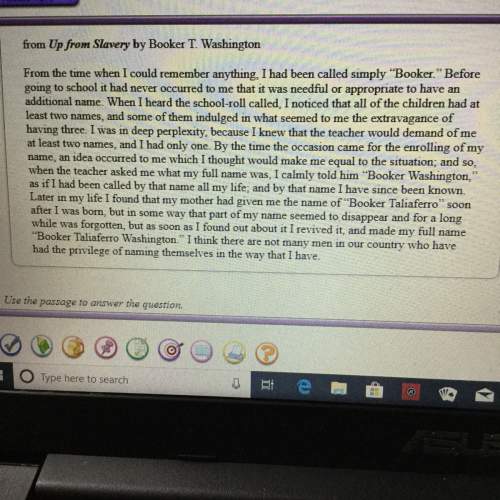
English, 12.02.2020 17:14 kalliebjones4511
Part 1
Most people remember Gandhi and Dr. Martin Luther King, Jr. as reformers who practiced non-violent forms of protest and advocacy. Both effectively changed the popular opinion about emotional issues for their countries and brought in a wave of change that was long overdue. But the practice of non-violent protest, or civil disobedience, started long before either Gandhi or King. It began with a quiet, shy poet who is best known for writing a lot about a pond.
Henry David Thoreau lived from 1817 until 1862, mainly in the area of Concord, Massachusetts. The issue that would tear the country apart in the 1860s had already begun dividing the nation. Thoreau was only 14 when Nat Turner led the slave rebellion in Virginia and was later hanged. In his late 20s, Thoreau began speaking against slavery in public, echoing the voices of freedmen like Frederick Douglass and Lewis Hayden.
Thoreau believed that a government that supported slavery was corrupt and immoral. He was also deeply suspicious of government. For these and other reasons, Thoreau refused to pay his poll tax for a number of years. The poll tax was a legal tax owed by every person. It was basically a tax on one's body. After not paying for years, he was at last arrested. He spent only one night in jail, however, as a relative paid the tax for him. He was reportedly furious that any tax was paid on his behalf.
It was this experience that Thoreau wrote about in an essay called "Civil Disobedience." In this essay, he argued that being moral and just came before allegiance to government. He wrote “If the machine of government is of such a nature that it requires you to be the agent of injustice to another, then, I say, break the law." He also felt that voting was not enough to ensure that the right thing be done. He wrote that "even voting for the right is doing nothing for it… A wise man will not leave the right to the mercy of chance…" He felt that one had a moral responsibility to resist unjust laws.
Which line from Part 1 best explains Thoreau's view on government?
Thoreau began speaking against slavery in public
The poll tax was a legal tax owed by every person
Being moral and just came before allegiance to government
A wise man will not leave the right to the mercy of chance…

Answers: 1


Another question on English

English, 22.06.2019 04:00
I’ve given a lot of thought to what one of them should be, and the answer seems clear.
Answers: 3

English, 22.06.2019 09:00
In a debate focused specifically on the topic of whether new laws are needed to prevent distracted driving, the following argument is made. which type of special appeal does it demonstrate? “my opponent is correct—distracted driving is very dangerous. many activities—texting, talking on the phone, looking at maps, eating breakfast—all of these contribute to accidents. yes, we have statistics to support that. however, my opponent is totally ignoring the role that improper and inconsistent maintenance of your vehicle can also have in causing accidents! ” a. false analogy b. red herring c. bandwagon d. fallacy of argument from ignorance
Answers: 2


English, 22.06.2019 09:30
In robert fosters birches what does the speaker think of when he sees birches bend left and right
Answers: 2
You know the right answer?
Part 1
Most people remember Gandhi and Dr. Martin Luther King, Jr. as reformers who practiced...
Most people remember Gandhi and Dr. Martin Luther King, Jr. as reformers who practiced...
Questions

Business, 30.09.2019 11:30

Biology, 30.09.2019 11:30

Mathematics, 30.09.2019 11:30

Biology, 30.09.2019 11:30

Arts, 30.09.2019 11:30

Mathematics, 30.09.2019 11:30

Mathematics, 30.09.2019 11:30

Biology, 30.09.2019 11:30




Mathematics, 30.09.2019 11:30

Mathematics, 30.09.2019 11:30


Mathematics, 30.09.2019 11:30




Mathematics, 30.09.2019 11:30




